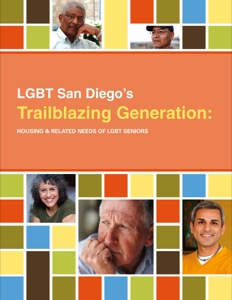Today, as they age and retire, the first Stonewall generation has another fight, a fight for the dignified, fair and equal treatment of themselves, their partners and friends as they age.
 While the policy recommendations below are important to all LGBT Americans, they are particularly vital for LGBT seniors who are forced to navigate a senior care system that often returns them to invisibility and isolation, and unjustly responds to their lifetime of hard work with unequal treatment under laws, programs and services.
While the policy recommendations below are important to all LGBT Americans, they are particularly vital for LGBT seniors who are forced to navigate a senior care system that often returns them to invisibility and isolation, and unjustly responds to their lifetime of hard work with unequal treatment under laws, programs and services.
Description of the San Diego LGBT survey sample
The average respondent’s age was between 64 and 65 years of age; median annual household income was $44,000, with 31 percent having already retired, 36 percent still working full-time, 13 percent working part-time and 10 percent unemployed and looking for work. 11 percent of the sample reported being disabled.
59 percent of respondents reported being in no significant relationship, 41 percent reported being in a significant relationship. Most respondents reported they either lived alone (48 percent) or with one other person (spouse or partner, 35 percent). 40 percent of respondents reported they currently did not have a will or living trust. 51 percent reported they had not designated a power of attorney.
More than one-fourth of all respondents (26 percent) reported that they “sometimes,” “often” or “almost always” attempt to hide their sexual orientation from neighbors or others. Similarly, 31 percent reported feeling embarrassed when asked about their sexual orientation. Lower income groups were the least likely to feel comfortable with disclosure. Almost 1/4 of all respondents (23 percent) failed to report that they “felt safe” based upon where they lived.
Lack of family, community and social support for LGBT seniors
In this study, San Diego seniors reported inadequate levels of family and community support to ensure ordinary levels of assistance as they age. Both gay men and lesbians reported being more likely to be single or not in a relationship than their aging heterosexual counterparts. Two-thirds of the non-LGBT population over 60 years of age reports being in a significant relationship and only 41 percent of San Diego LGBT seniors report being in a relationship. Further, San Diego LGBT seniors reported being more likely to live alone than their heterosexual counterparts.
In addition to being more likely to live alone and not be in a significant relationship, 68 percent of the LGBT seniors responding indicated that they had neither family or younger friends that they were certain they could count on for support or assistance as they age. Only 24 percent of this cohort reported having children, and although 58 percent had younger siblings, only 18 percent of those reported they could count on these siblings for assistance. These findings stand in stark contrast to the national aging data that indicate the overwhelming majority of care for the elderly is provided by family members and their children.
Financial concerns of LGBT seniors
Twenty-three percent of the LGBT seniors responding to this survey reported an annual income of less than $20,000 per year. Further, 29 percent of the sample reported having no planned income other than Social Security and 49 percent reported having less than $5,000 in savings for retirement. Only 16 percent of this sample reported having $100,000 or more saved for retirement.
Policy challenges
The unique challenges of the senior LGBT community clearly place them at a growing disadvantage as they age. Unfortunately, several discriminatory laws and practices at state and federal levels continue these inequities. Local, state and national LGBT and allied communities should be encouraged to advocate for policy changes that can help to create more fair and equal treatment of LGBT seniors as they age.
• Repeal the Defense of Marriage Act
• Secure marriage equality at the federal level
• Reform the laws regulating Social Security, family medical leave, Medicaid and long-term care, tax-qualified retirement plans, employee pensions, retiree health insurance benefits, veterans’ benefits and inheritance laws to allow for the designation of domestic partners, same-sex partners, permanent partners or selected similarly qualified adults to receive the “spousal benefits” named in such legislations, regulations or codes. These laws seriously undermine the financial security of many long-term couples and individuals.
• Ensure the passage and enforcement of comprehensive anti-discrimination laws in California that include all public accommodations and services, and further ensure compliance with such laws by ensuring ongoing training and affirmative demonstration of the cultural competency of such publicly funded agencies, systems and organizations.







